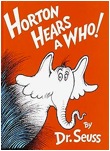Are there messages (morals) in our popular folklore? How about “The Three Little Pigs?” Aren’t we admonished to plan ahead and work hard…then bad things will pass by? In a similarly themed fable “The Ants and the Grasshopper”, has a similar message about the benefits of hard work; but in this case adds the complexity of mercy and redemption. Get’s kind of heavy!
What about my hero Dr. Seuss? Surely he didn’t subversively preach us a message… or did he?
Did the great Seuss approach politically sensitive issues?
Many of Geisel's books are thought to express his views on a myriad of social and political issues: The Lorax (1971), about environmentalism and anti-consumerism; The Sneetches (1961), about racial equality; The Butter Battle Book (1984), about the arms race; Yertle the Turtle (1958), about anti-fascism and anti-authoritarianism; How the Grinch Stole Christmas! (1957), about anti-materialism; and Horton Hears a Who! (1954), about anti-isolationism and internationalism. Shortly before the end of the 1972–1974 Watergate scandal, in which United States president Richard Nixon resigned, Geisel converted one of his famous children's books into a polemic. "Richard M. Nixon, Will You Please Go Now!" was published in major newspapers through the column of his friend Art Buchwald.
Although Geisel never made any explicit or implicit mention of the abortion debate in his books, the line "A person's a person, no matter how small!!" from Horton Hears a Who! has grown, over the objections of his widow, into widespread use on the pro-life side of the issue.

So, back to my point… would we be better off having stories with no moral value other than that they are just fun… sort of like “Archie” or “Beetle Bailey”… is reading for the sake of reading or for practice a good reason to read? Would it be better to read the ingredients of our favorite breakfast cereal (Wow 12% sugar!)? Or perhaps good story telling on it’s own is adequate reason for a story to exist. If they are reading, and enjoying the activity…that’s fine right?
What are your thoughts? Should Children’s Books teach a message (have a morale)…If so what kind of message? Where do we draw the line on appropriate and inappropriate messages? Is it OK if it is buried deep? Dr. Seuss viewed his own work as “Subversive as hell.”






No comments:
Post a Comment
www.lunchpailbooks.com appreciates your comments...